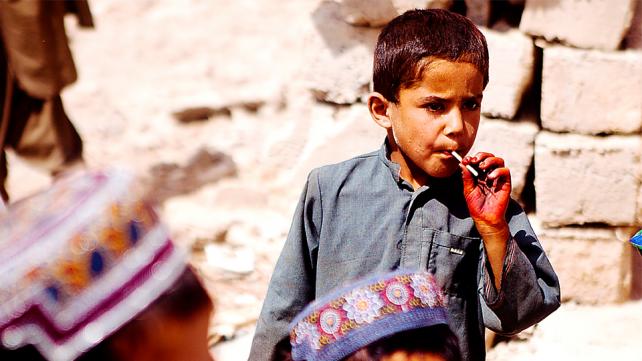
I wonder what eid will be for a BBC reporter. He recently said:
For the first time in Falluja, a city of 1,200 mosques, I did not hear a single call to prayer this morning.
I broke my Ramadan fast yesterday with the last of our food - two potatoes and two tomatoes.
The tomatoes were rotten because we have no electricity to run the fridge.
He is a Muslim citizen of Falluja who regularly reports for BBC. He also said:
"I counted the bodies of at least six US soldiers lying on the ground.
Some of them were badly mangled with various bits blown off. Others were in better condition, as if they had taken small-arms fire.
Some of the dead are beginning to rot in the streets."
American soldiers, Iraqi civilians and Iraqi rebels all have one thing in common: they are all human beings and did not plan to die this way. May God give patience to their loved ones and guide their leaders to save lives.
I wonder what kind of Eid Noor Muhammad will have this year?
The young Afghan boy, hardly 12 years old, lost his eyes and both arms during US bombing strikes on villages southwest of Jalalabad, Afghanistan. Will he be celebrating in the hospital, as he seeks to put together the shattered pieces of his life, now as a blind and disabled person? What will he be thinking on Eid day, helping the needy on Eid day, as other children his age receive gifts, hugs and visits from relatives and go outside to play with friends on this happy occasion? Noor will probably never be able to play the way he used to.
And what about the Fatimahs and Alis in Chechnya, Kashmir, Palestine and elsewhere people suffer throughout the year, with littlerepreive? How will they be celebrating this year?
These people are probably the last ones on our minds as we rush to finish our last minute gift shopping, pick out our outfit or decorate the house for the special occasion. While much of Eid is focused on how to make the holiday happy and special, especially for our children, we cannot neglect to share the pain of others on this day and must be helping the needy on Eid day.
These are the people for whom Eid will mean settling into a refugee camp not decorating their homes. For thousands of them, Eid will mean trying desperately to find food for the day, not preparing a special meal for the family.
One way to share the pain and helping the needy on Eid day, is by simply having a discussion with family and friends about the situation of people suffering the world over. There are hundreds of "hot spots" where men, women, and children are regularly killed, oppressed, raped, tortured and subjected to all kinds of oppression and humiliation. Sitting together as a family or with friends to discuss the situation, even if it's in just one specific place, will help share information, while developing sympathy and concern.
Another way is through Dua (supplication). After Eid prayers, following the sermon, most Imams make Dua for the oppressed everywhere, usually pinpointing specific areas which are in worse condition or more prominent. If you normally leave Eid prayers before the Khutbah, this year, make a special effort to stay and be part of the Dua of the Imam and the rest of the congregation. Also, don't forget to make Dua as an individual on Eid day, thanking Allah for His blessings while praying for people suffering everywhere.
Making Dua is a powerful tool to connect us to those who are not present with us, but who deserve our love, concern and attention. This is a way for us to share the pain of those who are suffering.
Another way of sharing the pain and trying to help is by arranging to send gifts and sweets. Some relief organizations have programs in place to provide orphans, for instance, with new clothes, a gift and sweets on Eid day. Others may have a program to provide a family with a meal of meat or some other special food.
Finally, you can share the pain by meeting with those who are from one of the "hot spots". Invite them over, ask them about their relatives and offer to help in any way you can. Doing this will allow you to see an in-person example of a suffering person who may have escaped the fate of his or her brothers and sisters, but is still naturally concerned for family abroad. He or she can be your window into the daily struggles of those suffering in one part of the world.




Comments
I really like your web site and i would like to thank everyone who are working in sound vision. i have learnt alot about my religion through this web site. i would like you to give more information on da poor people in asia. thank you!
Location
Kudos to the poster above. May Allah ease the pain of our brothers and sisters in Darfur and all other Muslims suffering under corrupt regimes.
Location
Let's also not forget to remember our brothers and sisters who are suffering in Darfur, Sudan, and the thousands of innocent people suffering in jails at the hands of oppressive governments.
Location
Add new comment